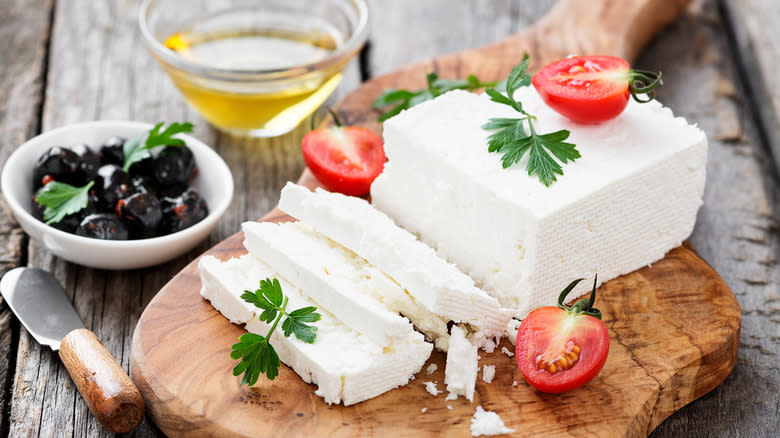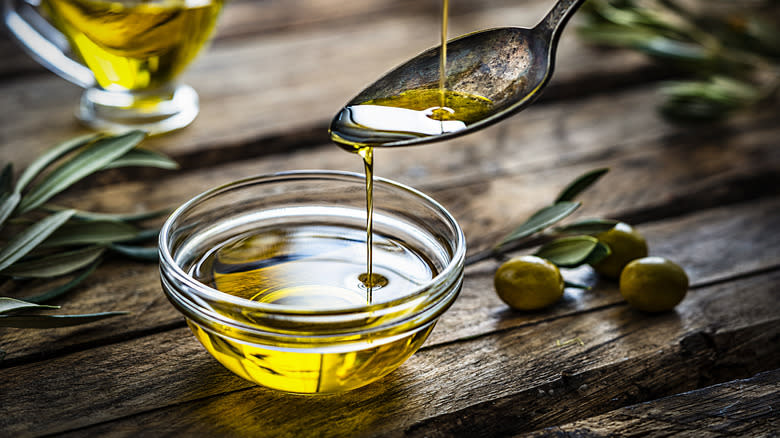The Mason Jar Hack That Keeps Soft Cheese Super Fresh And Flavorful

Soft cheese is a beautiful and ephemeral thing. French feta, burrata, baby mozzarella, and brie are all delicate, creamy cheeses meant to be eaten fresh. Because they can't be aged, none of these cheese types are going to last very long, either -- even in the fridge. Whether you're entertaining or have bought more cheese than you can polish off in a day or two, there's a way of storing soft cheeses that not only preserves them, but lends a big boost to their flavor and presentation: Get yourself a wide-mouthed mason jar and marinate the cheese in olive oil and whatever flavoring adjuncts you see fit.
What will this simple trick do for you? It'll lengthen the shelf life of the cheese, enhance its flavor, and make for a pretty spectacular addition to the dinner table. Think about it: An oil marinade will do almost as much for soft cheese as a wine marinade can for chuck roast. Perhaps best of all, this trick gives you ample opportunity to choose not only the flavoring additions, but even what type of olive oil because -- guess what -- flavored olive oil is a very handy thing to have around.
Read more: French Cooking Tricks You Need In Your Life
Olive Oil Preserves Soft Cheese

As with most good cooking ideas, preserving soft cheese in olive oil is an ancient practice -- this one dating back, quite literally, to the beginning of the common era. A variant of a spreadable yogurt-derived cheese called labneh has been rolled into balls, coated in herbs and spices like dried mint and za'atar, and submerged in olive oil by people in the Levant for over 2,000 years. Later, canny French cooks started doing similar with pieces of an earthy, tangy goat's milk cheese called chèvre. (You can still find jars of oil-preserved chèvre in Paris bistros, just as marinated labneh continues to be served for breakfast by Lebanese cooks.)
How does oil preserve cheese? Mainly by acting as a barrier to degenerative elements like oxygen, bacteria, and other nasty microorganisms. This greatly increases the shelf life of these cheeses: Feta covered in olive oil will last several weeks in the refrigerator -- far longer than the few days it is expected to survive on its own. It might sound counterintuitive, but this method keeps soft cheese fresher for longer. And, unlike skirt steak, soft cheeses won't absorb much of their marinade -- just its flavor. (Be advised that olive oil will congeal in the fridge. So, either cut it with something like canola oil, or allow it to warm up closer to room temperature before serving.)
Herbs Enhance Cheese Flavors

Now, how you flavor the soft cheese oil is entirely up to you. Valencia orange slices and Calabrian chilies? Sprigs of rosemary, thyme, and a tablespoon of black peppercorns? The possibilities are endless. Perhaps narrow your flavoring candidates by considering what kind of cheese you're preserving and where it originates. Naturally, these same considerations apply to the type of olive oil used (with the one admonition that this process benefits from using the good stuff). Greece, for example, is home to many exquisite soft cheeses and tends to produce magnificent, fruity olive oil. Mediterranean herbs like bay, mint, rosemary, and oregano appear throughout Greek cuisine, as do fruits like lemon. You get the idea.
Likewise, Italy is not lacking for delectable soft cheeses. Since the tangy, buffalo-milk cheese mozzarella di bufala originated in the Campania region of Italy, why not complement it with a green-scented, delicately bitter extra-virgin olive oil from the same region? Now, imagine drizzling one of these flavored oils on toasted focaccia. By putting just one jar of oil-marinated cheese on the dinner table, you will -- in a small but unforgettably delicious way -- be presenting another world to your guests.
Read the original article on Daily Meal.

